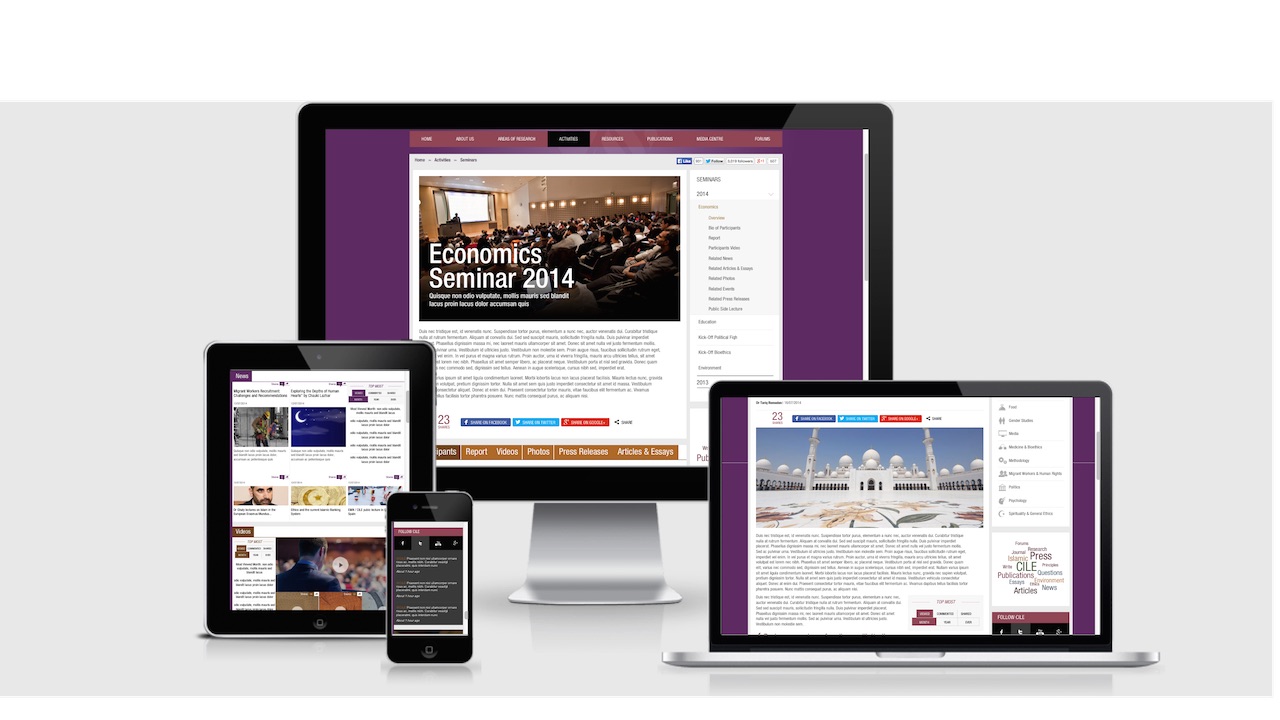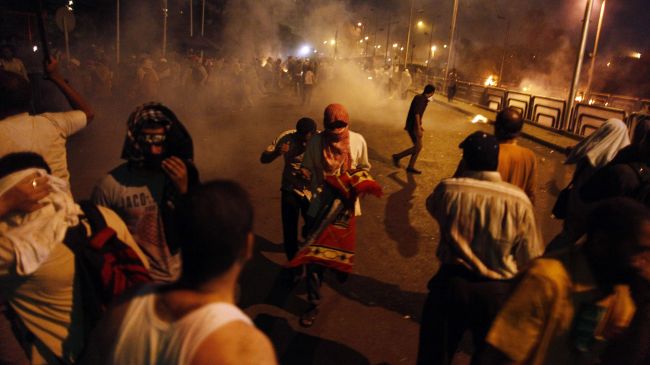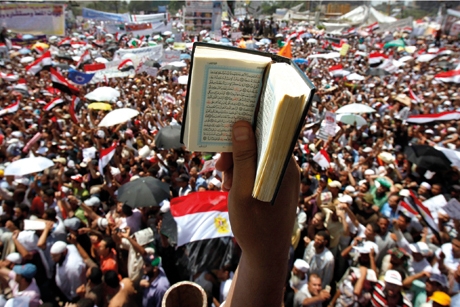Banned from America during six years, Professor Tariq Ramadan arrived yesterday 7th April to New-York. Below you will find a press review
At Last Allowed, Muslim Scholar Visits
But for Mr. Ramadan, one of the foremost European scholars of the Islamic world, there was still one last hurdle: a closed-door session with three immigration agents, one after the other, who asked him where he planned to go, whom he planned to meet and what he planned to discuss.
Two hours after his plane from Paris landed, Mr. Ramadan, wearing a dark suit and a smile of relief, cleared customs and shook hands with two representatives of the American Civil Liberties Union, which had litigated his case, and Muna Ali, an assistant of his who lives in the United States.
“How are you, Muna?” he asked.
“You kept us waiting,” she said, with good humor. “What’s new?”
The group split up into two cabs, and Mr. Ramadan, 47, boarded one with Jameel Jaffer, a representative of the civil liberties union.
If Mr. Ramadan was flustered or annoyed by the immigration stop, he did not betray it. “I was expecting this,” he said calmly.
In a telephone interview the night before, he said he had anticipated the moment when he would come face to face with the American government in the form of the immigration officer. His plan was to approach that encounter with “a peaceful mind.”
His admission into the country, he said, was good for two reasons: “Just to clear my name,” he said, “and for the work that we’re doing.”
“The important thing is the substance, to be in touch with many people,” he added.
In the summer of 2004, Mr. Ramadan, a Swiss citizen, was preparing to travel to the United States to become a tenured professor of religion, conflict and peace-building at the University of Notre Dame when the Bush administration revoked his visa.
The government cited a provision of the Patriot Act that allows the barring of foreigners who “use a position of prominence within any country to endorse or espouse terrorist activity.” Officials eventually pointed to Mr. Ramadan’s donations of about $1,300 from 1998 to 2002 to a Swiss-based charity that the Treasury Department later categorized as a terrorist organization because it gave money to Hamas, the militant Palestinian group.
Mr. Ramadan, now a professor of Islamic studies at the University of Oxford, contended he was unaware of any links between the charity and Hamas or terrorist activities. The professor, who had visited the United States dozens of times, said he believed that the organization was involved in legitimate charitable activities.
The civil liberties union challenged the exclusion in a lawsuit filed on behalf of Mr. Ramadan and three organizations that had invited him to speak: the American Association of University Professors, the American Academy of Religion and PEN American Center. His lawyers argued that the exclusion was an illegal form of censorship, motivated by the professor’s political views and criticism of American policy.
Last year, a federal appeals court in Manhattan reversed a lower court ruling that had upheld the exclusion, and in January, Mrs. Clinton signed the order effectively lifting it.
His five-day visit will involve a series of meetings and public appearances, including a panel discussion Thursday night at the Cooper Union’s Great Hall. He is also scheduled to speak at functions in Chicago, Detroit and Washington.
For Mr. Ramadan, the greatest difficulty of the exclusion was feeling as if his rights were being impinged. “I knew I did nothing wrong,” he said.
In addition, he was frustrated that he was not able to meet with Muslims and others in the United States. “I really think that virtual communication has nothing to do with reality,” he said as his cab headed toward his hotel in Manhattan. “I really think that if you want to work with people — activists and scholars — you have to come and share views.”
Mr. Ramadan has been a polarizing figure in the world of contemporary Islamic studies. His scholarship has argued that Muslims can be both fully Western and fully Muslim, and that they need not simply choose a path of assimilation or a path of isolation. His work has focused on Europe, where his writing and lecture tapes have been embraced by many Muslim immigrants.
But he has also antagonized a wide range of critics, who have accused him of being a radical in a moderate’s clothing, and of speaking in contradictions. Some have tried to draw direct links between his teachings and the Islamic radicalism espoused by his grandfather, Hassan al-Banna, the founder of the Muslim Brotherhood, a sometimes-violent political group in Egypt. But Mr. Ramadan, who has rejected violence in the service of Islam, accuses his critics of not reading him carefully enough — or not reading him at all.
His trip closely follows the publication of the latest of his more than 25 books, “What I Believe,” which is intended to lay out his philosophy in simple terms.
As the cab approached the Lincoln Tunnel, Mr. Ramadan revisited his lawsuit with Mr. Jaffer, who was the lead lawyer in the case. “Thank you so much for all that,” Mr. Ramadan said.
He paused, then asked, “Do you think they will keep me for one hour or so every time I come?”
Tariq Ramadan Comes to America!
For years, the U.S. government has barred entry to Tariq Ramadan, the Swiss Islamic scholar. This stupid policy began in 2004: Ramadan was about to assume a professorship at Notre Dame when the State Department revoked his visa. At first the government gave no reason, then pointed to Ramadan’s small donations to a couple of pro-Palestinian organizations that were suspected of funnelling money to Hamas. Since he gave the money between 1998 and 2002, and Hamas was not put on the official terrorist list until 2003, the argument made no sense on its face, and it gave rise to the suspicion, which Ramadan himself has often voiced, that he was banned because of his criticisms of U.S. policies.
I’m not convinced that this is true, but I am convinced—and wrote at the time—that shutting out this serious and widely influential intellectual was a self-defeating mistake. It made Ramadan’s sinister view of the U.S. seem all the more plausible. In the struggle for world opinion after September 11th, it made America look intolerant and narrow-minded and afraid.
Ramadan remained persona non grata throughout the Bush years, while his case, taken up by the A.C.L.U., PEN, and others, made its way through American courts. During this period, the missing Muslim scholar became the subject of a furious intellectual argument in the pages of the country’s major publications. Ian Buruma and Timothy Garton Ash praised him as a thinker who can reach young European Muslims and help them to reconcile their religious identity with citizenship in secular democracies. Paul Berman wrote a long article for The New Republic, the basis of his new book “The Flight of the Intellectuals,” to be published this month, arguing that Ramadan is to be feared, not admired—that his writings reveal a strong kinship with the radical Islamist ideology of his grandfather, Hassan al-Banna, founder of the Muslim Brotherhood. To Berman, Ramadan is a false moderate, and in embracing him Western intellectuals like Buruma and Garton Ash have betrayed their own liberal principles. Buruma and Garton Ash argued back. Others joined the fray.
The Obama Administration, to its credit, didn’t wait for a final legal ruling on the Ramadan case. This past January, Hillary Clinton signed an order lifting the ban and, in effect, allowing the debate about Ramadan and his ideas to happen in person. And so this tale is background to what will be Ramadan’s first public appearance in America, at a panel discussion at 7 P.M. on Thursday night, at Cooper Union in New York. The subject could be none other than “Secularism, Islam, and Democracy,” and Ramadan’s co-panelists will include Slate’s Jacob Weisberg, Princeton’s Joan Wallach Scott, the Gallup Center for Muslim Studies’ Dalia Mogahed, and yours truly.
In case you can’t make it, Interesting Times will let you know what happened.
NEW YORK — A prominent Muslim scholar banned from the United States for six years returned Wednesday for visits to four cities, saying he wants the U.S. to know its greatest threat is that it will surrender its core values because it fears Muslim-dominated countries.
"In the name of your fear or mistrust of Muslim-majority countries, you may end up betraying your own values," Tariq Ramadan said in a telephone interview.
Ramadan said he was happy to be in the U.S. as he made the 20-mile trip in a car from Newark (N.J.) Liberty International Airport to New York City, where he was to speak on a panel Thursday at The Cooper Union college.
"My name has been cleared," he said.
Still, he said he was delayed at customs for about an hour as he was interviewed by authorities there.
The 47-year-old professor at Oxford University in England was permitted to return to the United States after Secretary of State Hillary Rodham Clinton in January signed orders enabling re-entry for him and Adam Habib, a scholar from the University of Johannesburg in South Africa.
Habib spoke Wednesday at the City University of New York Graduate Center. The Department of State said when the orders were signed that it wanted to enable the professors to return to encourage a global debate.
The American Civil Liberties Union filed a lawsuit on Ramadan’s behalf after his U.S. visa was revoked in 2004 as he was about to move to Indiana to take a tenured teaching job at the University of Notre Dame. He has spoken at Harvard and Stanford universities and elsewhere.
Later, his visa applications were denied on the grounds that he had donated $1,336 to a charity that gave money to Hamas, a Palestinian militant group. Ramadan has said he has no connections to terrorism, opposes Islamic extremism and promotes peaceful solutions.
On Wednesday, Ramadan said the controversy over the donation "was something ridiculous."
Ramadan said he will be speaking with scholars in Chicago and Detroit before finishing his trip on Monday in Washington, where he will meet with members of Congress and speak at Georgetown University.
He said he planned to remain outspoken, criticizing Muslims at times and criticizing any of "our policies that are wrong." He said he was speaking as a European and a Westerner.
Ramadan said he wanted to be part of meeting the "responsibilities in the West to open channels for better communications with Muslim-majority countries."
He said he knew he would not be permitted to return to the United States during the administration of former President George W. Bush and wasn’t certain even once President Barack Obama was elected.
"I heard lots of words and wanted to see if he would be able to deliver what I got," he said. "When listening to President Obama in Cairo, I said, ‘This is a very good speech.’"
Obama extended a hand to the Islamic world in a speech in Cairo in June 2009.
"So long as our relationship is defined by our differences, we will empower those who sow hatred rather than peace, those who promote conflict rather than the cooperation that can help all of our people achieve justice and prosperity," Obama said then. "And this cycle of suspicion and discord must end."
Ramadan said no one can deny there are improvements in communications between the United States and the rest of the world.
"To change mentalities and policies takes time and effort," he said. "I want to be instrumental in this."
ACLU attorney Jameel Jaffer, who rode with Ramadan into the city, said Clinton deserves credit for clearing the way for Ramadan and Habib to re-enter the country but some scholars still remain excluded because of their viewpoints.
"We would like this administration to retire the practice of ideological exclusion," he said.
SOURCE : Associated Press









